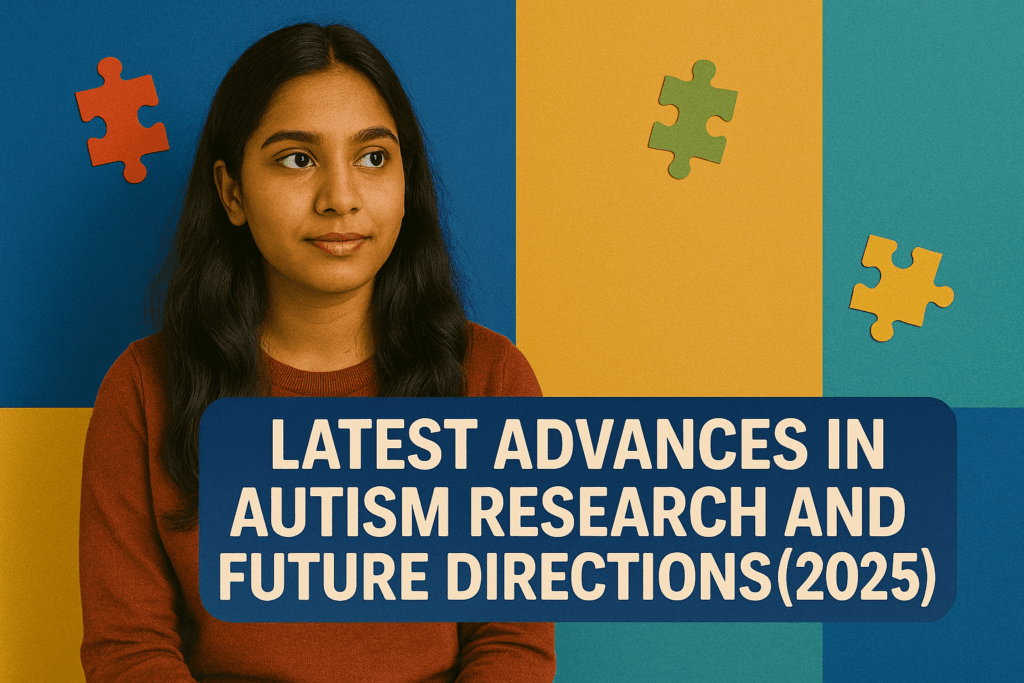🔬 Autism research is evolving at a remarkable pace. With groundbreaking studies, technology-assisted interventions, and a growing understanding of the autistic brain, we are entering a new era in autism care and inclusion. Let’s explore the latest advances in autism research and future directions (2025) that offer hope, solutions, and empowerment to autistic individuals and their families.
🧠 Understanding Autism: Where Research Stands
For decades, autism was viewed through a narrow lens. But recent research has broadened our understanding of the autism spectrum as a neurodevelopmental condition with varied presentations.
📌 Key Findings So Far:
- Autism is not caused by vaccines — a widespread myth now thoroughly debunked.
- Genetics play a significant role in autism development. Up to 80% of autism risk may be inherited.
- Early intervention dramatically improves life outcomes for autistic children.
- There is no single “autism gene”, but clusters of genes may interact with environmental factors.
🧬 Genetic & Epigenetic Breakthroughs
🔎 Researchers are mapping entire genomes to understand how DNA influences autism traits. In 2025:
- Whole-genome sequencing (WGS) is being used in diagnostic screening.
- Scientists are identifying rare gene variants linked to language delays and sensory issues.
- Epigenetic studies show how environmental exposures in pregnancy (e.g., toxins, stress) affect gene expression related to autism.
🧬 Quote from Dr. Karen He, Geneticist at Stanford:
“We’re now looking beyond DNA. It’s how genes are turned on or off that can shape neurodiverse development.”
🧠 Brain Imaging & AI-Based Diagnostics
🧠 Advanced neuroimaging, especially functional MRI (fMRI), reveals that autistic brains process information differently—not incorrectly.
✨ 2025 Research Highlights:
- AI is helping detect autism in infants as young as 6 months by analyzing facial expressions and motor patterns.
- MRI data can predict language delays and social challenges before symptoms emerge.
- Machine learning models can now differentiate between autism and ADHD with over 90% accuracy.
📷 [Image suggestion: AI brain scan with color patterns]
🤖 Tech-Powered Interventions
🧠 In 2025, technology is transforming autism care:
- 🧑🏫 Virtual Reality (VR) helps teach social skills by simulating real-life scenarios.
- 🤖 AI companions offer non-judgmental support for practicing conversation and emotion recognition.
- 📱 Autism-specific apps help track meltdowns, mood swings, and daily routines with real-time data for therapists and parents.
🛏️ Autism and Sleep: A Research Focus
Many autistic individuals suffer from chronic sleep issues. Current research is exploring:
- Melatonin production irregularities
- Gut-brain connection and how microbiomes affect circadian rhythms
- The role of sensory sensitivities in sleep disruption
New wearable devices track not just sleep duration but also quality, helping researchers tailor therapies more effectively.
🌿 Nutritional & Gut-Brain Studies
🥦 Gut health has become a major area of interest in autism research.
Findings in 2025 show:
- Autistic children often have different gut bacteria profiles than neurotypical peers.
- Trials using probiotics and gluten-free diets show mixed but promising results.
- There’s growing evidence of gut-brain axis dysfunction, which may contribute to anxiety and sensory challenges.
🧩 Inclusivity in Research
🌍 Researchers are now prioritizing diversity in autism studies by including:
- Girls and women with autism (historically underdiagnosed)
- People of color and from low-income backgrounds
- Non-speaking autistic individuals
📣 Quote from autistic advocate Aiden M.:
“We’re not subjects—we’re partners. Autistic voices belong in autism science.”
🚀 What’s Coming Next?
Here are some future directions shaping up in 2025 and beyond:
- 🧪 Biomarker identification for earlier, blood-based autism diagnosis
- 🧠 AI-driven personalized therapy recommendations
- 🧠 Integration of wearable tech for real-time emotion tracking
- 🌐 Global, open-access autism databases for cross-border research
- 🧠 Combining neurofeedback with mindfulness training for better self-regulation
❤️ Support Autism Wings Inc.
At Autism Wings Inc., we believe in creating holistic support systems for children with autism—including nutritional education, therapy, and soon, a dedicated school!
We’re currently raising funds to build a specialized Autism School that nurtures every aspect of development. Your contribution can change lives.
🌐 Visit us: www.autismwings.com

